democracynow.org
Stories:

After 36-Day Student Occupation, University of California at Davis Chancellor Is Put on Leave
This week, University of California President Janet Napolitano placed the chancellor of University of California, Davis, Linda Katehi, on investigatory administrative leave, pending an investigation into a number of infractions, including her decision to spend at least $175,000 to try to scrub the internet of criticism following the 2011 pepper-spraying of student protesters by campus police. The school made national headlines after the video showing police spraying seated students directly in the face at close range went viral. Earlier this spring, students at the University of California, Davis, occupied the office of Chancellor Katehi and staged a 36-day sit-in calling for her resignation, to protest her handling of student protests and allegations of conflicts of interest. Democracy Now! recently spoke with Parisa Esfahani and Kyla Burke, two of the students who took part in the sit-in.
TRANSCRIPT
This is a rush transcript. Copy may not be in its final form.
AMY GOODMAN: We are on the road in Tucson, Arizona, as part of our 100-city 20th anniversary tour. We begin today’s show looking at student protests here in Arizona and in California. Earlier this spring, students at the University of California, Davis, occupied the office of school chancellor Linda Katehi for five weeks, calling for her resignation over her mishandling of student protests and allegations of conflicts of interest. Well, this week the students won a victory of sorts, as the University of California President Janet Napolitano placed Katehi on administrative leave, pending an investigation into a number of infractions, including allegations of nepotism and her decision to spend at least $175,000 to try to scrub the internet of criticism following the 2011 pepper-spraying of student protesters by campus police. The school made national headlines after this video showed police spraying students directly in the face at point-blank range.
PROTESTERS: Don’t shoot students! Don’t shoot students! Don’t shoot students! Don’t shoot students! Don’t shoot students! Don’t shoot students! Don’t shoot students! Don’t shoot students! Don’t shoot students! Don’t shoot students!
AMY GOODMAN: In 2012, the University of California reached a $1 million settlement with 21 protesters who were pepper-sprayed. Earlier this month, The Sacramento Bee reported that the UC Davis, University of California, Davis, paid consultants $175,000 to improve its online image, in part by scrubbing negative search results related to the pepper-spray incident. That news came to light while students were occupying the office of Linda Katehi. Well, I was recently on the campus of UC Davis, on this 100-city tour, and spoke to two of the students involved in the five-week sit-in.
PARISA ESFAHANI: My name is Parisa Esfahani. I’m a fourth-year at UC Davis studying women and gender studies, Middle East and South Asian studies. I was a part of the 36-day sustained sit-in of the fifth floor of Mrak Hall, where the chancellor’s office is. We left on Friday. I was there because there are serious concerns that not just us that sustained that sit-in, but many students have, but never feel empowered to voice on our campus. We pay a hefty tuition to be at this school. We are supposed to be the voices and the faces of the university. It’s an institution of education, but it’s become an institution of money making and lack of accountability. And we want our voices to be on the front. And it’s become—oh, we’re tired. We’re tired of like wondering why that’s not happening, and we’re tired of the normalization of the privatization of the university, and we’re tired of the kind of campaign that the university runs.
PROTESTERS: Hey, hey! Ho, ho! Linda Katehi’s got to go! Hey, hey!
KYLA BURKE: My name is Kyla Burke. I’m a fifth-year environmental science and management student at UC Davis. We were calling for the resignation of Katehi and for the process to be changed and democratized so students and workers have an active say in who runs their university. We’re calling Katehi to resign for—there’s a lot of reasons. Recently, there were the three moonlighting scandals that came out, with her working for DeVry and Wiley & Sons textbook and King Abdulaziz University, which all, for different reasons, represent conflict of interest or unethical decisions to work for them. But it’s not only that. There’s a long history of Katehi messing up, going back to 2011 and the pepper-spray incident. Personally, I thought she should have resigned then. But since then, as a student here, I’ve just watched a pattern of administration messing up and not being held accountable. And we wanted to change that and to be involved.
AMY GOODMAN: Can you talk about the latest issue that was uncovered by The Sacramento Bee?
KYLA BURKE: Yeah. So the latest—the latest issue that The Sacramento Bee discovered was that the university had spent $175,000 to try and wipe references to the pepper spray and to Katehi off the internet. And it really shows how concerned—what their concerns are, with like protecting administration and maintaining good PR, and not actually holding anyone accountable or making the changes, after that kind of incident, they should have.
AMY GOODMAN: Can you explain what happened in November of 2011?
KYLA BURKE: Yeah. In November of 2011, students were peacefully protesting tuition hikes in solidarity with the Occupy Wall Street movement. And they were in the Quad, and the university decided they wanted to remove them. And so, Officer Pike pepper-sprayed students at point-blank range.
AMY GOODMAN: This was the Davis police officer.
KYLA BURKE: A Davis—UC Davis police officer, I believe.
AMY GOODMAN: What happened to Officer Pike?
KYLA BURKE: Officer Pike actually received more compensation than the students that were pepper-sprayed, for emotional distress from the incident. So, yeah, I believe he got like—
AMY GOODMAN: How much did the students get?
KYLA BURKE: I think they got—
PARISA ESFAHANI: Somewhere between $11,000—like $20,000 each.
KYLA BURKE: And he got $38,000.
PARISA ESFAHANI: Was that it?
KYLA BURKE: Yeah.
AMY GOODMAN: And is he there any longer?
KYLA BURKE: No, he no longer works for the school.
AMY GOODMAN: Why did you end the sit-in at the administration offices?
KYLA BURKE: So, we had been in the sit-in for five weeks, and we had reached the point where we thought it was time to do something new. We had done a lot by that point. It had—it was like an in-depth activist training. Everyone who was in there, we created a community and solidarity, and learned a lot about like how to organize and how to work together. And we had brought a lot of national attention. I doubt The Sacramento Bee would have been putting in those records requests and finding out that information, if there wasn’t a 36-day sit-in going on to bring that kind of media attention in. So we thought it was a good point to leave and to try something different and to continue our protest in new ways. We didn’t—we don’t see it so much as an end as the beginning of a new phase.
PARISA ESFAHANI: And now we need to build our relationship to the rest of the student body, because there’s still—most students don’t know what’s happening. They didn’t know that we were in Mrak for five weeks.
AMY GOODMAN: How many of you were there?
KYLA BURKE: So, there was about like, total, I would say about like a hundred students that were involved. There were about 40 students who were like sleeping there regularly and doing shifts in Mrak. I don’t know. I’m not great with like guessing numbers, but that’s—
PARISA ESFAHANI: But our numbers—like, those were people that showed up physically in the space. But on Facebook, for example, on social media, there were like over a thousand students from Davis who were in support of us.
AMY GOODMAN: Explain this first issue of the conflict of interest.
KYLA BURKE: Yeah, so, there are three like conflict of interests or unethical moonlighting positions that Katehi had. The first was with DeVry University, which she broke policy by taking it. She didn’t get the approval that she was required to.
AMY GOODMAN: And what was that position?
KYLA BURKE: For—
PARISA ESFAHANI: Just on the board.
KYLA BURKE: On the board of DeVry University, which, additionally, DeVry University is being investigated by the federal government for like unethical practices and essentially lying to their students.
AMY GOODMAN: This a for-profit university?
KYLA BURKE: A for-profit university. And so, there was that. So it’s like taking—making the choice to be involved with that company that’s being investigated for like unethical practices, for how it treats its students. And additionally, like, she broke the policy and didn’t do what she was supposed to do and just did what she wanted to. And then there was Wiley & Sons textbook, which is a fairly obvious conflict of interest.
AMY GOODMAN: What did she do?
KYLA BURKE: She got a position on the board of Wiley & Sons textbook, which is—
PARISA ESFAHANI: They’re all board positions.
KYLA BURKE: They’re all board positions, yeah—which is a textbook company, which is a fairly obvious conflict of interest, because what’s in the best interest of the students is lower textbook prices, and what’s in the best interest of that company is not. And UCs are like one of their biggest customers, and prices went up while she worked for them. So...
PARISA ESFAHANI: Specifically, UC—John Wiley & Sons is—UC Davis is John Wiley & Sons’ biggest client. And there is another conflict of interest in that Chancellor Katehi’s husband is a professor in chemistry, I believe, and his class used John Wiley & Sons textbooks last quarter. So she’s serving on the board, and he’s making his students get those textbooks. That’s a pretty clear—yeah.
KYLA BURKE: And then, additionally, there was King Abdulaziz University, which is a Saudi Arabian university, that was essentially buying citations. They were paying like prominent professors at universities to, like, include them on their papers, so that they would be—like, show up as working there. So it went from a university that no one had ever heard of to being ranked above MIT in one year, which, as like a prominent research university, that’s like an unethical research practice. So...
AMY GOODMAN: And what did Chancellor Katehi have to do with that?
KYLA BURKE: She was on the board of that, as well, she said, to bring diversity to the school, although we couldn’t figure out what that exactly meant.
AMY GOODMAN: That was Parisa Esfahani and Kyla Burke, two students at UC Davis who took part in a recent 36-day sit-in calling for UC Davis Chancellor Linda Katehi to resign.
On Wednesday, the University of California President Janet Napolitano placed Katehi on administrative leave. In a statement, she said, quote, "Information has recently come to light that raises serious questions about whether Chancellor Katehi may have violated several University of California policies, including questions about the campus’s employment and compensation of some of the chancellor’s immediate family members, the veracity of the chancellor’s accounts of her involvement in contracts related to managing both the campus’s and her personal reputation on social media, and the potential improper use of student fees. The serious and troubling nature of these questions, as well as the initial evidence, requires a rigorous and transparent investigation." Those, again, the words of UC President Janet Napolitano, who is the former governor of Arizona.
In a statement released earlier today, student protesters said, quote, "The collective efforts of UC Davis students, faculty, staff, and community members are responsible for yielding this result. It is crucial to note that it was not Janet Napolitano, or University of California Office of the President, who led us to this moment of justice, but our uncollapsing spirit and belief in political protest," they said. The letter goes on to say, quote, "Katehi is but a cog in the UC machine. We are aiming to scrap the prototype and create a new system that both works for and is run by students, faculty, workers, and the community at large. Until system-wide change takes place, our demonstrations will continue," they wrote. ... Read More →

Historian Peter Linebaugh on The Incomplete, True, Authentic & Wonderful History of May Day
Sunday is May Day, and organizers and activists across the United States are planning celebrations to mark the 10th anniversary of the massive May Day marches of 2006. That year, more than 1.5 million people took to the streets to support workers’ and immigrant rights. It was one of the largest days of protest in the country’s history. Now we look at a new book by historian Peter Linebaugh entitled "The Incomplete, True, Authentic, and Wonderful History of May Day." Linebaugh is the author of many books, including "The Many-Headed Hydra" and "The Magna Carta Manifesto." Historian Robin D. G. Kelley has said of Linebaugh: "There is not a more important historian living today. Period."
TRANSCRIPT
This is a rush transcript. Copy may not be in its final form.
AMY GOODMAN: That’s Rude Mechanical Orchestra performing a few May Days ago. Yes, this is Democracy Now!, democracynow.org, The War and Peace Report. I’m Amy Goodman. We’re on our 100-city tour today in Tucson, Arizona, headed to Fresno, California, tonight, and then we’ll be in California, and then New Orleans as well as Houston on May Day.
That’s right, Sunday is May Day, or International Workers’ Day. Organizers and activists across the United States are planning celebrations to mark the 10th anniversary of the massive May Day marches of 2006, when more than a million-and-a-half people took to the streets to support workers’ and immigrant rights. It was one of the largest days of protest in this country’s history. In most countries, May Day is an official government holiday, with mass demonstrations, rallies, marches, all being held to express labor solidarity and celebrate workers’ rights. But here in the United States, May Day is not a government-sanctioned holiday, even though the commemoration originated here over a century ago.
Well, today we look at The Incomplete, True, Authentic, and Wonderful History of May Day. That’s the name of a new book by historian Peter Linebaugh. He is the author of many books, including The Many-Headed Hydra and The Magna Carta Manifesto. Historian Robin D. G. Kelley said of Linebaugh, quote, "There is not a more important historian living today. Period." Well, I sat down with Peter Linebaugh earlier this month to discuss his new book. I began by asking him how May Day was established and how it came to be established right here in the United States.
PETER LINEBAUGH: Well, it never has yet been established by the establishment. That is, the government doesn’t want to look at May Day. But it’s been—always been a contested holiday and contested in the United States. In a way, there’s manufactured ignorance that prevents us from knowing about May Day. The rest of the world celebrates it, but here at the center, where May Day was created as a workers’ holiday, as a—we’re in ignorance. And this ignorance has been caused. Instead, we have Labor Day in September, and then they changed the meaning of May Day, and they called it Law Day. Eisenhower did that. Cleveland did the Labor Day. But May Day itself is much older.
And there’s two stories about May Day that everyone should know, on this May Day in particular, because in this May Day people all over the United States, finally, are thinking about what is a political revolution, and they’re thinking about what is socialism. May Day can help us. It’s a day, first of all, of no work. It’s a day of celebration. It’s a day to dance around the maypole. My mother-in-law used to say, "Hooray, hooray, the 1st of May, outdoor loving begins today!"
So, there are two stories: There’s a green story, and there’s a red story. The green story begins first, and that goes back to agriculture, it goes back to the sun, because this is springtime. This is the beginning—the Earth has turned in its relationship to solar energy. The green story is a story of fertility. Winter is over. Summer is upon us. It’s a time of fruition and dancing and happiness. It’s a time to dance around the maypole. And the first maypole in North America was in 1627 in Merrymount, Massachusetts, which is in Boston Bay, in Quincy. It’s called Merrymount. And Thomas Morton, with a ganymede, runaway servants, some former slaves and indigenous people, danced around the maypole. They had the first poetry ever in English in North America. This was 1627. It was a multicultural, antihierarchy, anticolonial assembly. And the Puritans in Boston came down heavy against it. They came down yelling, "God’s scarcity, be quiet, shut up!" This was Cotton Mather and William Bradford. They put an end to it. But this green story persisted, not as an established holiday, but as a custom of people on both sides of the Atlantic, in North and South America. That’s the green story.
Now, it comes to an end with a mechanization of agriculture, with the reaper, the mechanical reaper, which is made in Chicago. I’m coming to the red story now. After the American Civil War, workers, women, disabled people felt empowered and thrilled at the victories. I’m quoting from David Roediger now, his recent book. It’s wonderful, because he shows a direct link between this huge freedom struggle and the ancient May Day story. They said they began the eight-hour movement. That’s the movement of eight hours’ work, eight hours’ rest and eight hours’ play. That was their slogan. The McCormick reaper, that’s going to shave the Great Plains, was produced in Chicago by iron molders, skilled workers. And they took the lead, on the 1st of May, 1886. But McCormick and the police shot four of them dead. In response to this police violence, a meeting was called in Haymarket Square in Chicago a few days later, on the 4th of May. And at that time, a stick of dynamite was thrown. There were 200 policemen there to put an end to this meeting. The dynamite wreaked havoc among both the demonstrators and—there was a police casualty as well as seven casualties among the workers who were there.
AMY GOODMAN: Does anyone know who threw the dynamite?
PETER LINEBAUGH: To this day, it’s a matter of contested and controversy. No one knows. No one knows. The police claimed that it was demonstrators, and demonstrators claimed it was a police provocateur. Paul Avrich, Jim Greene—these are some historians—don’t know. Well, this caused a spasm of reactionary violence all across the United States. The trade union movement in city after city was betrayed and attacked by police forces. And in Chicago itself, eight people were charged in a kangaroo court with murder and found guilty. Four were hanged. And they were hanged on the 11th of November, 1887. Albert Parsons, he sang "The Internationale" as he swung at the gallows. August Spies said, "The day will come when our silence will be more powerful than the voices you throttle today," and then he was choked and swung.
The result was, throughout the world, and especially in Mexico, but in England, in Ireland, in France, in Italy, the eight-hour movement became an international movement of workers all over. That’s the origin of the red side, because, later, the socialist movement, the anarchists and then the communist parties, they took it. They were forced to take it by workers all over who were demanding an eight-hour day. Men and women, black and white, Asian and European, all over, celebrate that day and the Chicago ideal. The Chicago ideal was, again, eight hours’ work, eight hours’ rest, eight hours for what you will. This is why we celebrate it.
AMY GOODMAN: And why don’t we celebrate it in the United States as an official holiday? What happened to May Day? Why is it called Law Day, yet there is a Labor Day in September?
PETER LINEBAUGH: It’s a contest, Amy. It’s a contest. It’s a confrontation. The rulers of the United States, the 1 percent, the slavocrats, the Gilded Age capitalists, the billionaires and the police forces behind them—this is at the end of the 19th century—they leagued together in order to separate May Day and that workers’ struggle from the rest of the world. And Grover Cleveland in 1894 said—was forced by labor unions; he wanted their vote—he said, "OK, you can have a Labor Day. It’s going to be the 1st of September." And what you’re supposed to do on the 1st of September is not march, but go shopping. Go have a—go get some sales at the new department stores. That’s Labor Day.
And then, what they did with May Day—this is during the height of the Cold War—Eisenhower in 1958 said, "We’ll call—we’ll call May Day 'Law Day.'" And to this day, law schools all over the U.S. celebrate May Day by declaring it’s all about law. But, in fact, if you go back to the very origins of May Day in North America—that’s the green story—you will see that Thomas Morton and the others, they thought that moral decisions belonged in the conscience of the collective rather than in the laws of the Puritans. Technically, they were called antinomians, but that’s a theological term in opposition to strict law.
AMY GOODMAN: In your book, which is a great title, The Incomplete, True, Authentic, and Wonderful History of May Day, you write about May Day in light of Waco and L.A.
PETER LINEBAUGH: Yeah, that’s back—I do, because I want to go into the roots. The thing there was X squared. That was—you know, we had a red and green story. The X squared means—this was back at a time when kids were wearing caps that an X on them. And, of course, it’s from Malcolm X. And Malcolm X chose the X because he didn’t know his African name. Part of slavery was robbing people’s identity, taking their name away. So that X was a constant reminder. And I explain the X with two words: expropriation—you’re being taken away from the means of life, taken away from the Earth—and exploitation, or being forced to labor by those who have the means and materials of work. So that’s the origin of that X squared. And it was after Waco and after the L.A. riots—when was this? back in ’92—that we began to see again people of different ethnicities, people of different so-called races, workers, trying to join together once again. And huge violence was set upon them.
And I take that story back to the Ghost Dance, back to the May Day riots at the beginning of capitalism in Europe in 1517. And then the great Ghost Dance, at the same time that the lands were being robbed from the Native Americans on the Great Plains and in the West, that Ghost Dance, it just scared the life out of the 1 percent, out of the gilded people. To this day, I don’t understand it, Amy, how just dancing one inch at a time could so frighten the powers that be. And it led to the great massacre of Wounded Knee. So these are the themes that I tied together in that particular chapter.
AMY GOODMAN: And then there’s May Day of 2006, at least May 1st, 2006.
PETER LINEBAUGH: Of the great mobilization of Hispanic-speaking Americans, which is the largest mobilization in North America ever, especially in Chicago and in L.A. And that’s a tradition we need to—that helped us remember what May Day really is, that—how it began at Haymarket, because it was Spanish workers in Mexico, Spanish workers in the plantations and mines and factories, who maintained the story of los mártires, of the martyrs, when we in North America had forgotten it. So we—workers around the world, we need your help. We can’t remember everything. We need to be reminded. And that 2006 mobilization helped to do it. And the other great mobilizations were in South Africa on May Day that led to the collapse of apartheid.
AMY GOODMAN: Explain that event.
PETER LINEBAUGH: I can’t explain it much further, other than trade unions, political parties would come out into the streets, which is what we must do again in 2016. On this day, May Day, this weekend, we must come outside and celebrate our lives, our future, our dreams, and do it with one another and start talking with one another.
AMY GOODMAN: Your title, The Incomplete, True, Authentic, and Wonderful History of May Day, explain.
PETER LINEBAUGH: It’s incomplete because the job’s not finished. It’s true for the two stories I told you, the green story and the red story. It’s authentic because this book, this knowledge, belongs to working people, slaving at the kitchen sink, doing night shifts, doing flexi time, doing precarious work. And it’s authentic because los mártires, the Mexican people, the Hispanic people, remind us of it. It’s not part of institutions, of universities. And it’s wonderful, because if you go out on May Day and start dancing around the maypole, all kinds of things will happen.
AMY GOODMAN: Historian Peter Linebaugh, author of The Incomplete, True, Authentic, and Wonderful History of May Day. May Day is Sunday. And on this 100-city tour on Sunday, we’ll be in Houston in the afternoon, and we’ll be in New Orleans in the evening.
This is Democracy Now!, democracynow.org, The War and Peace Report. When we come back, new laws being pushed here in Arizona, and we’ll talk to a protester who was assaulted at a Donald Trump rally and then arrested. Stay with us.. ... Read More →

Northern Arizona U. Students Launch Sit-In as Fossil Fuel Divestment Movement Sweeps Country
Students at Northern Arizona University, or NAU, are in the midst of a sit-in to call on their school to divest from fossil fuels. At least eight students have been arrested after they refused to leave a university building at closing time. Their protest is part of a national "Fossil Free" movement to pressure colleges to address the issue of climate change. For more, we’re joined by Michaela Mujica-Steiner, a senior at Northern Arizona University, and Karina Gonzalez, a graduate student in the NAU Forestry Department. Both were arrested during protests demanding fossil fuel divestment.
TRANSCRIPT
This is a rush transcript. Copy may not be in its final form.
AMY GOODMAN: Well, now we turn to another student protest, this one taking place on the campus of Northern Arizona University, or NAU, in Flagstaff, where we did the broadcast on Thursday. So far this week, at least eight students have been arrested after they refused to leave a university building at closing time while staging a sit-in to call on the school to divest from fossil fuels. The protest at Northern Arizona University began earlier this week when some 150 students spent over 12 hours occupying the Student and Academic Services Building. The sit-in comes amidst a growing national movement on college campuses for fossil fuel divestment. Earlier this month at the University of Massachusetts, Amherst, about three dozen people were arrested after launching a similar sit-in. And at Columbia University, students occupied Low Library, demanding University President Lee Bollinger endorse fossil fuel divestment.
Well, on Thursday here in Arizona, I spoke with two coordinators of the "Fossil Free" protest at Northern Arizona University: Michaela Mujica-Steiner, a senior there at NAU, and Karina Gonzalez, a graduate student in forestry. They were among those arrested during the occupation. I started by asking Michaela to explain the action.
MICHAELA MUJICA-STEINER: So, this action is part of a larger national escalation that is happening across campuses to get universities to divest from the top 200 coal, oil and natural gas corporations. Specifically, we are taking this action to get our president, Rita Cheng, to come out with a formal public statement in support of full fossil fuel divestment.
AMY GOODMAN: Karina Gonzalez, what has the president of NAU here said from the beginning? And who actually makes the decisions here?
KARINA GONZALEZ: Yeah, that’s a really great question. She actually hasn’t said very much on the issue, in general. Though we have met with her in the past, she hasn’t officially yet taken a stance on fossil fuel divestment, which is—
AMY GOODMAN: In those meetings, what has she said?
KARINA GONZALEZ: She said that she would like more information on the finances of fossil fuel divestment, which we have presented to her. So, one of the bigger issues that this movement is dealing with is a 200-year-old mindset that fossil fuels are a good investment, which is frankly no longer true.
AMY GOODMAN: Can you talk about the companies that you want NAU, Northern Arizona University, to divest from, Michaela?
MICHAELA MUJICA-STEINER: Yeah. So, that information, the specific companies, is actually not public information, because the NAU Foundation is a private entity.
AMY GOODMAN: Explain. A lot of places don’t have—
MICHAELA MUJICA-STEINER: Yes.
AMY GOODMAN: —a university foundation, but you do.
MICHAELA MUJICA-STEINER: Yes.
AMY GOODMAN: NAU Foundation.
MICHAELA MUJICA-STEINER: Yes. So, the NAU Foundation is a private entity that makes investments for Northern Arizona University, and it is a private entity. It is a private, nonprofit corporation. And so, a lot of information is not transparent to the public.
AMY GOODMAN: So, are you planning to continue this protest? And for how long?
MICHAELA MUJICA-STEINER: We plan to continue this protest until we get our demand met that the university president will come out with a statement of support on fossil fuel divestment. And we believe that we can be persistent in this.
AMY GOODMAN: I wanted to turn to Bill McKibben, the co-founder of 350.org, who, when we had him on Democracy Now! recently, described how the fossil fuel divestment movement has grown over the years.
BILL McKIBBEN: We started this divestment movement, you remember, three years ago. And when we started, it was small. The first college to divest was Unity College up in Maine, whose endowment was, I think, under $10 million, maybe well under $10 million. In the past two weeks, the California state Legislature has to divested CalPERS and CalSTRS, two of the biggest pension—two of the 20 biggest pension funds on Earth. And then yesterday comes the news, kind of out of the blue, that the UC system, you know, the iconic campuses at Berkeley and UCLA and Santa Barbara and Davis, beginning to divest at least from coal and tar sands oil. Their portfolio is not $10 million, it’s $98 billion. There’s a kind of just dramatic momentum behind this people’s uprising on climate change.
AMY GOODMAN: That was Bill McKibben talking about the escalation of these protests. Finally, Karina Gonzalez?
KARINA GONZALEZ: This movement has seen incredible momentum, not only within the past few years, but within the past few months and weeks. In the past three weeks, 62 students across the nation have gotten arrested because of this movement. And this is just a small example of what is happening not only across the nation, but across the world, which is incredibly exciting to see and also demonstrates how much power students and young people really have.
AMY GOODMAN: That’s forestry graduate student Karina Gonzalez and women and gender studies undergraduate Michaela Mujica-Steiner, both students at Northern Arizona University in Flagstaff. They were both arrested this week, calling on their school to divest from fossil fuels.
And this is Democracy Now!, democracynow.org, The War and Peace Report. We’re broadcasting from Tucson, Arizona. When we come back, though, Sunday is May Day. Stay with us. ... Read More →

Lena Rothman: A Trump Supporter Assaulted Me at a Rally — Then Police Arrested Me Instead of Him
As violence broke out at a Trump rally in Costa Mesa, California, on Thursday night, we take a look at the increasingly hostile atmosphere that protesters are encountering at Trump’s events. Last month, one of Trump’s supporters was caught on video sucker-punching an anti-Trump protester at a rally in Tucson. But there was another assault at that rally that few heard about. Lena Rothman says she was assaulted by a Trump supporter, and when she reported the assault to police at the Trump event, she herself was arrested. For more, we speak with Lena Rothman.
TRANSCRIPT
This is a rush transcript. Copy may not be in its final form.
AMY GOODMAN: I want to go to a slightly different subject. At a Donald Trump rally in Tucson last month, one of Trump’s supporters was caught on video sucker-punching an anti-Trump protester as he was being led away. Tony Pettway was arrested for misdemeanor assault and released. The protester, Bryan Sanders, was kicked out of the rally after chanting "Liar" and holding a sign that read, "Trump is bad for America." This is Bryan Sanders speaking after the rally.
BRYAN SANDERS: Donald Trump is perfectly welcome to go ahead and run for president. What he’s not welcome to do is to suggest that everybody who opposes him should be violently attacked, that he should be handed the presidency outside of the rules of his own party. I mean, this is sounding like 1933 up in here. And then you saw all hell break loose, this and that, and he’s stomping me. Incredible scenes. I understand that people support Donald Trump. But do they support this kind of scene, really? Donald Trump is associating himself with violent, extremist people, who are willing to go to any lengths, apparently.
AMY GOODMAN: That was Bryan Sanders, who was sucker-punched at the Trump rally. But there was another assault at the rally that you may not have heard about. Lena Rothman says she was assaulted by a Trump supporter. When she reported the assault to police at the Trump event, she herself was arrested. Lena Rothman is here with us. Lena, what happened? This was in March.
LENA ROTHMAN: Yeah, March 19th. I was on a staircase with other organizers and protesters, and this man came barreling down the staircase, pushing and punching people. And then, on—after a while, he made his way back up, and I was in his way. I couldn’t move over because there was a railing. And I got knocked down by him, and I hit my back on a post.
And I decided—after he had got up the staircase, I decided I wanted to take out a complaint, and I went looking for the police. And I went up to the balcony. I spoke to an officer, and I told him what happened. And he said he couldn’t file a complaint, he was busy, he couldn’t leave his post. So, then another officer came in, and I spoke to him. And I ended up speaking to six or seven different policemen to file the complaint, and they all said, no, they couldn’t leave their post, or they ignored me.
And then, finally, they steered me over to their supervisor. And I spoke to him, and I said I wanted to identify the guy, because people were leaving by this time. And when I identified him, I went running over, when I saw him come out. And the supervisor came in back of me, but he was really taking his time. So I was afraid the guy that had assaulted me was going to leave, so I kind of ran up to him. And I’m looking in back of me, and I’m saying, "This is him. This is him. This is the guy." And I ended up being arrested.
AMY GOODMAN: You ended up—now, interesting—
ISABEL GARCIA: Yes.
AMY GOODMAN: Isabel Garcia, you sent a photograph of about 20 police officers posing with Donald Trump outside his rally here in Tucson?
ISABEL GARCIA: That’s correct. I was very outraged—I was at the protest, and—that they had Lena in handcuffs. When another guy had assaulted a UCLA student, she had a concussion. Nobody was concerned, but they arrested—
LENA ROTHMAN: It was the same guy.
ISABEL GARCIA: And so, we wanted to know, you know, whether these police officers were involved in this—in these incidents, because, obviously, if they’re Trump supporters and posing while on official duty with Trump, I think that is a real problem for our city. And it’s a real problem for the criminal justice system.
AMY GOODMAN: You’re representing Lena Rothman?
ISABEL GARCIA: Yes, I am. And we have court on Tuesday.
AMY GOODMAN: And what are you calling for?
ISABEL GARCIA: We’re calling for a complete dismissal of these charges.
AMY GOODMAN: And how do you think Donald Trump’s rhetoric affects the legislation here in Arizona? Do you think it does?
ISABEL GARCIA: Oh, absolutely. It wasn’t until Trump came in to really raise the ire of the right wing in Maricopa County that these bills began to get some traction again.
AMY GOODMAN: Well, I want to thank you both for being with us, and it’s certainly a discussion we will continue to have in this presidential election year with Republican front-runner Donald Trump. Isabel Garcia—
ISABEL GARCIA: Thank you so much.
AMY GOODMAN: —co-chair of the Coalition for Human Rights, and Lena Rothman, arrested at a Trump rally in Tucson after she went to police to complain about being assaulted by a Trump supporter.
Well, that does it for the show. We’re on a 100-city tour marking Democracy Now!'s 20th anniversary. Tonight I'm speaking in Fresno, California, on Saturday in San Mateo and Grass Valley, California, then on May Day, May 1st, Sunday, in Houston in the afternoon and New Orleans in the evening at 7:00. On Monday, we’ll be in Sarasota, Florida, and on Tuesday we’ll be headed to Atlanta, Georgia, then to Washington state, to Spokane, Olympia and Seattle, finally, at Town Hall. You can check our website at democracynow.org to follow the tour, to find out if we’re coming to a city near you.
That does it for the show. We have job openings, hiring for our video news production fellowship and internship program. Go to democracynow.org.
Special thanks to Mike Burke, Nermeen Shaikh, Carla Wills, Laura Gottesdiener, Denis Moynihan. ... Read More →

Is Trump's Rhetoric Reigniting Anti-Immigrant Legislation in Arizona?
Amid a presidential election cycle marked by anti-immigrant rhetoric, we take a look at how the national campaigns are affecting state politics in Arizona. A number of anti-immigrant bills are currently making their way through the Arizona state Legislature. On Thursday, House lawmakers gave initial approval to a measure that would require undocumented immigrants convicted of crimes to serve maximum prison terms without the possibility of probation or early release. Other bills under consideration here would withhold money from sanctuary cities and bar state funds from being used to resettle refugees. Last month, Arizona Governor Doug Ducey signed another measure that requires undocumented people convicted of crimes to serve a longer portion of their prison sentences before they are turned over to immigration authorities for deportation. For more, we speak with Isabel Garcia, co-chair of Coalición de Derechos Humanos, or Coalition for Human Rights, based here in Tucson. She just retired from her post as Pima County legal defender last July after more than 22 years.
TRANSCRIPT
This is a rush transcript. Copy may not be in its final form.
AMY GOODMAN: This is Democracy Now!, democracynow.org, The War and Peace Report. We’re on the road in Tucson, Arizona. We turn now to the anti-immigrant rhetoric of the 2016 presidential race and how it could be impacting state policy right here in Arizona.
DONALD TRUMP: When Mexico sends its people, they’re not sending their best. They’re not sending you. They’re not sending you. They’re sending people that have lots of problems, and they’re bringing those problems with us. They’re bringing drugs. They’re bringing crime. They’re rapists. And some, I assume, are good people.
AMY GOODMAN: That’s Republican presidential front-runner Donald Trump speaking last June. Is his rhetoric now becoming policy? Here in Arizona, a number of anti-immigrant bills are making their way through the state Legislature. On Thursday, House lawmakers gave initial approval to a measure that would require undocumented immigrants convicted of crimes to serve maximum prison terms without the possibility of probation or early release. The bill has already passed the Arizona state Senate. Other bills under consideration here would withhold money from sanctuary cities and bar state funds from being used to resettle refugees. On March 30th, the Arizona governor, Doug Ducey, signed another measure that requires undocumented people convicted of crimes to serve a longer portion of their prison sentences before they’re turned over to immigration authorities for deportation. Back in 2010, Arizona faced boycotts and national condemnation for its sweeping anti-immigrant law, SB 1070. But advocates say the state saw a lull in anti-immigration bills—until Trump’s rhetoric helped reignite the issue.
To talk more about the landscape here in Arizona, we’re joined by Isabel Garcia. She’s co-chair of Coalición de Derechos Humanos, or Coalition for Human Rights, based here in Tucson. She just retired from her post as Pima County legal defender last July after more than 22 years.
Great to have you with us, Isabel.
ISABEL GARCIA: Good to be here.
AMY GOODMAN: And unlike Bill O’Reilly a number of years ago when you went on, we will not shut off your mic as you speak.
ISABEL GARCIA: Good.
AMY GOODMAN: Talk about what’s happening here in Arizona.
ISABEL GARCIA: Well, if you recall, I was with you in New York City a week before 1070 was signed back in 2010. And here we are again. The state, of course, has been the leader in anti-human measures to be applied to immigrants. And there was a lull after the boycotts. We’ve got to be very clear that the only reason that this Legislature stopped in 2011 was because of the boycotts. They were—
AMY GOODMAN: Explain who was pushing them.
ISABEL GARCIA: The boycotts were being organized by the communities all over Arizona—in Phoenix, lots of organizing; here in Tucson, lots of organizing. And there were even politicians that called for a boycott of Arizona because of the repressive measures that were included within 1070.
AMY GOODMAN: Did corporations join in?
ISABEL GARCIA: Corporations were on the outside until 2011. 2010 is when it was signed. In 2011, they passed—they had another bill that was about to pass. The night before passing, 60 CEOs of the top corporations in Arizona authored a letter and had it delivered to the Legislature that morning, telling them to stop it, that the boycotts had caused lots of damage here in Arizona, that they understood the issues, you know, cause problems, but that it was time to stop. So, yes, the 60 top companies in Arizona put a stop to it, after the fact. I’d like to say that they joined in our humanitarian concerns. They were not involved in that. They were involved with their bottom dollar.
AMY GOODMAN: So, explain what these laws are now that have passed parts of the Legislature.
ISABEL GARCIA: So, as you’ve stated, the one that is being the closest to being passed right now is the one that violates equal protection. In other words, saying that undocumented immigrants would face totally different range—the same range of penalties, but would have to serve the maximum, not be allowed to be released in any kind of form, and would have to serve the maximum allowable. So if it’s a misdemeanor, you know, punishable by six months, you get the six months. If you’re punishable by five years, you would get the maximum. I don’t see how that can pass constitutional muster.
AMY GOODMAN: Well, let’s go to what the Arizona governor said. On March 30th, Governor Doug Ducey signed HB 2451, which requires undocumented people convicted of crimes to serve a longer portion of their prison sentences before they’re turned over to immigration authorities for deportation. In a statement, Governor Ducey said in part, quote, "Public safety is the number one role of government, and in light of reports that criminals released early without serving their full sentence are committing crimes in our communities, we must stand for the rule of law." This is a different law.
ISABEL GARCIA: That is a different one, and that has been signed. This is a law that permits undocumented people to be considered for release after serving half of their term, if they have a final order of deportation. So nobody’s staying in the community. And, of course, we cut—through Governor Symington, we cut parole for other people to 85 percent, so already we’re in—causing mass incarceration. And now we had an opportunity with Mexicans to be deported after serving half their time. Now this new legislation is for people who are being charged right now. They would be convicted—if they’re convicted, they would have to serve the maximum allowable. They would not be allowed, you know, consideration for either probation or any kind of early release. Or let’s say the judge wants to give you a minimum sentence; they would have to give them the maximum.
AMY GOODMAN: Talk about the killings by Border Patrol here in Arizona and how legislation SB 1070 plays a role.
ISABEL GARCIA: Well, 1070 plays a role in the fact that people are deported. Once people are whisked away—you go to a school to leave your child, and all of a sudden you don’t come back. Two hours later, you’re in Mexico. We have cases where people, trying to come back, die in the desert. After being here 15 years, have [inaudible] died crossing back to be with his five children here in Tucson. So, the racism that has been engendered with 1070—
AMY GOODMAN: And again, 1070 is?
ISABEL GARCIA: SB 1070 is the bill that we call "Show Me Your Papers, Please." Although the Supreme Court was wise enough to really reject other portions, they did not reject Section 2B, which says if a police officer has reasonable suspicion that you’re in the country in violation of federal immigration laws, he or she can detain you. Now, the Supreme Court said they couldn’t detain you longer than it takes to give you a ticket, but we have many cases where they detained them 40 minutes, 50 minutes, waiting for the police department. In other words, it’s legalized racial profiling. ... Read More →
Headlines:20 Anti-Trump Protesters Arrested at Trump Rally in California
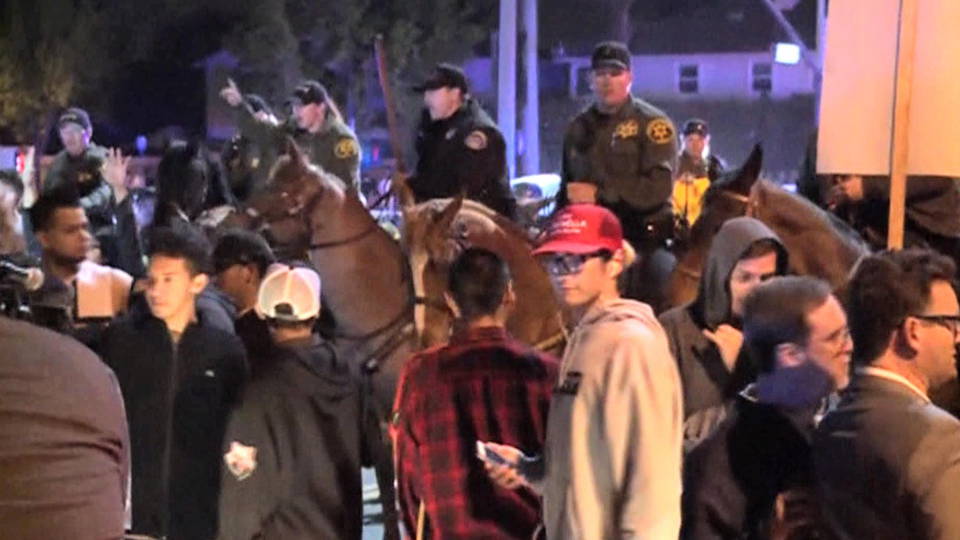
Around 20 people were arrested in Costa Mesa, California, after demonstrators took to the streets to protest a Donald Trump rally Thursday night. Protesters blocked traffic, including the on-ramp to the freeway. The demonstrations involved both clashes between Trump supporters and protesters, and clashes between protesters and the police clad in riot gear. Several thousand people attended the Trump rally. The California primary is June 7.
Ex-House Speaker Boehner Calls Cruz "Lucifer in the Flesh"

Former House Speaker John Boehner launched a verbal attack against Republican presidential candidate Ted Cruz, calling him "Lucifer in the flesh" and a "miserable son of a bitch." Boehner was speaking during a forum at Stanford University. The comments were recorded by journalists from the campus paper, The Stanford Daily. This clip begins with Stanford history professor David Kennedy.
John Boehner: "Lucifer in the flesh. In Washington, I have many Democrat friends, and I have Republican friends. I get along with almost everybody. But I have never worked with a more miserable son of a bitch in my life."
Pro-Choice Groups Call for Cruz to Fire Troy Newman from Campaign
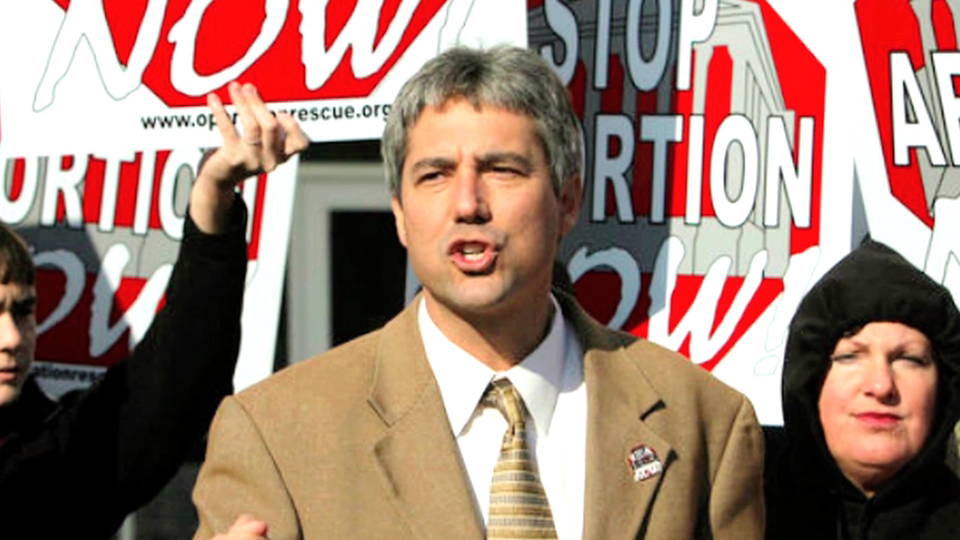
Meanwhile, pro-choice groups are calling on Ted Cruz to fire anti-choice activist Troy Newman from his campaign. Newman is the head of the militant anti-abortion group Operation Rescue, which is known for its targeted harassment of abortion clinic workers. Newman himself has implied that abortion providers should be executed, writing the U.S. is "blood-guilty" for its failure to kill "abortionists." Newman currently serves as one of the co-chairs of Ted Cruz’s "Pro-Lifers for Cruz" coalition.
State Department Condemns Assad's Attack on Aleppo Hospital
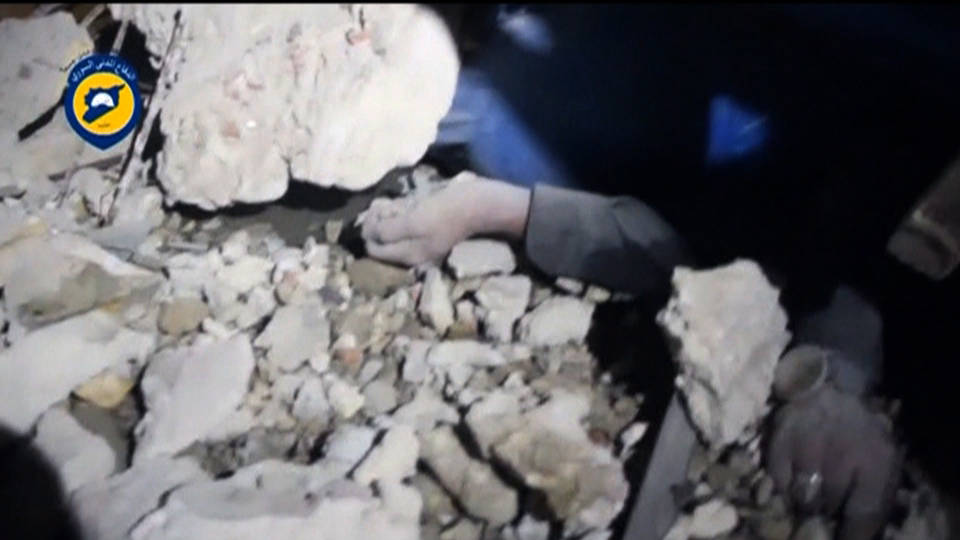
The U.S. State Department has condemned Wednesday’s airstrike on a Doctors Without Borders-supported hospital in Syria. The organization says the airstrike killed at least 50 people, including doctors, nurses and patients. On Thursday, State Department spokesperson John Kirby said the airstrike was likely carried out by the Syrian regime.
John Kirby: "We obviously find this attack reprehensible in every possible way. We’re looking at dozens, if not several dozens, of casualties in this strike on what was clear that was a medical facility. The details and the circumstances of the attack are still coming in, but it sure bears all the hallmarks of the kinds of strikes that the regime has done in the past on treatment facilities and, frankly, on first responders."
Pentagon to Release Report on Bombing of MSF Hospital in Afghanistan
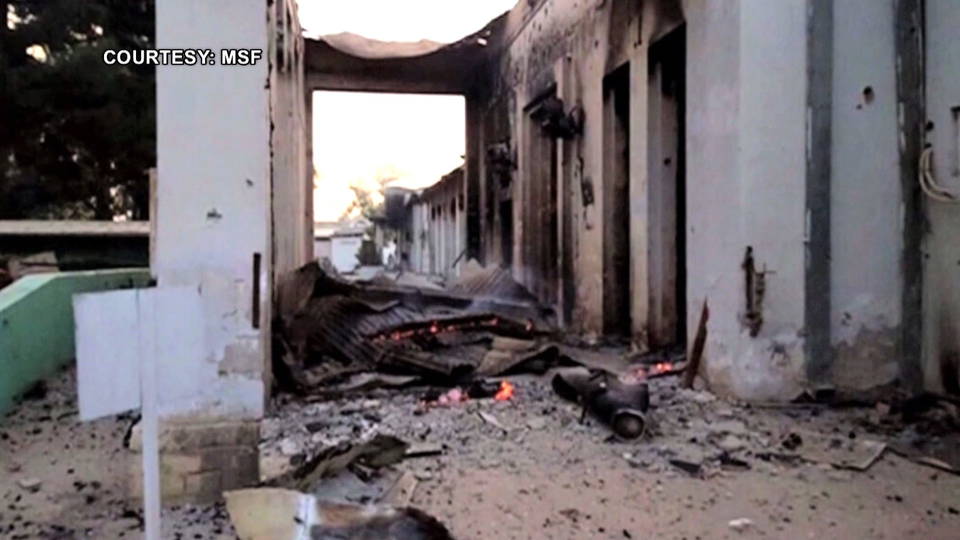
This comes as the Pentagon is slated to release a full report today on its internal investigation into the U.S. military’s bombing of a Doctors Without Borders hospital in Kunduz, Afghanistan, last year. The attack killed 42 people, including patients and staff. The Pentagon says 16 people have received some form of administrative discipline, but no one has been court-martialed. In response, Amnesty International called for an independent investigation, writing, "These reports demonstrate the need for an independent investigation, outside of the chain of command, to determine what happened in Kunduz and to assess potential criminal wrongdoing."
Three People Linked to San Bernardino Suspected Shooters Arrested
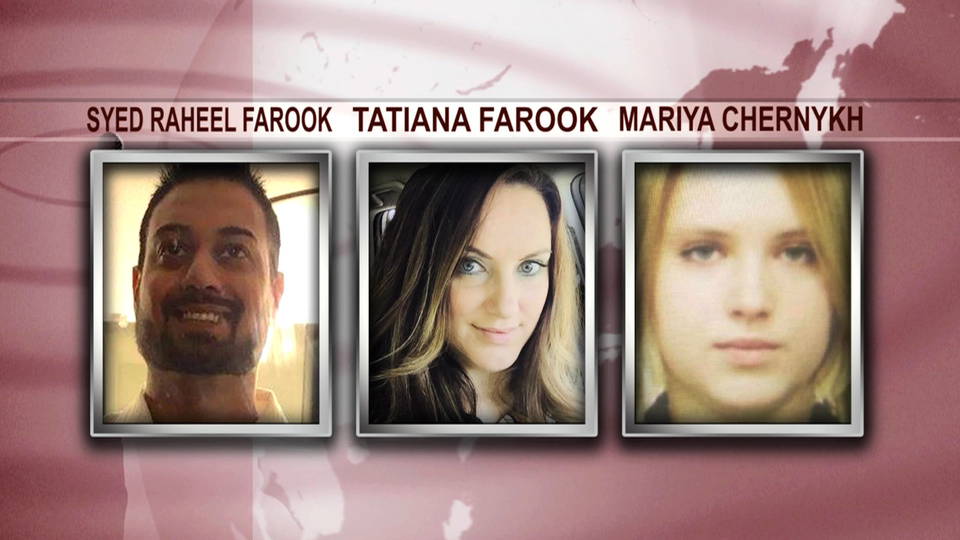
In California, the brother of one of the suspected shooters in the San Bernardino massacre was arrested Thursday, along with his wife and sister-in-law, on charges unrelated to the shooting which killed 14 people at the Inland Regional Center on December 2. Prosecutors say Syed Raheel Farook, Tatiana Farook and Mariya Chernykh have been charged with conspiring to make a false statement to immigration officials while under oath.
VP Biden Visits Iraq Amid Massive Protests Against Iraqi Government
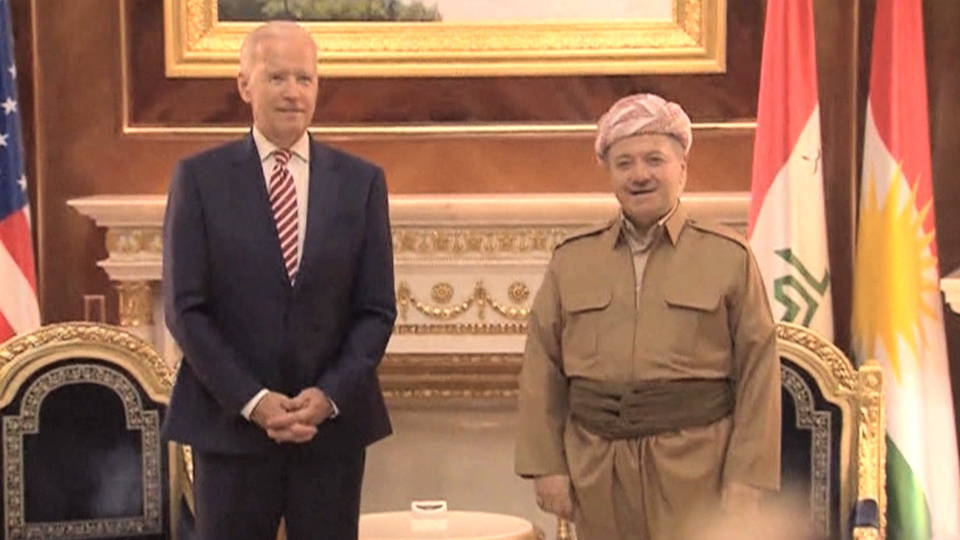
Vice President Joe Biden made a surprise visit to Iraq on Thursday, where he met with Iraqi Prime Minister Haider al-Abadi and other top officials. It was Biden’s first visit to Iraq since 2011. This comes as Prime Minister al-Abadi continues to face massive popular protests against his administration. Earlier this week, hundreds of thousands of people took to the streets in Baghdad to demand the appointment of new officials to Parliament.
Obama Administration Proposes Up to $40 Billion in Military Aid to Israel

The Obama administration has proposed an unprecedented military funding package to Israel that could top $40 billion over 10 years. It is the largest military funding package the U.S. has ever offered to any nation. Israeli officials are reportedly demanding even more funding. The U.S. currently gives Israel $3 billion a year in military funding under a deal slated to expire in 2018. Meanwhile, Israeli police have shot and killed a Palestinian woman and her teenage brother near a checkpoint in the Israeli-occupied West Bank on Wednesday. Israeli police say the two were armed with knives. Palestinian authorities said the victims, 23-year-old Maram Abu Ismail and her 16-year-old brother, Ibrahim Taha, were en route to Jerusalem for a doctor’s appointment.
Amnesty: 11 People Killed by Police in Brazil's Rio de Janeiro This Month
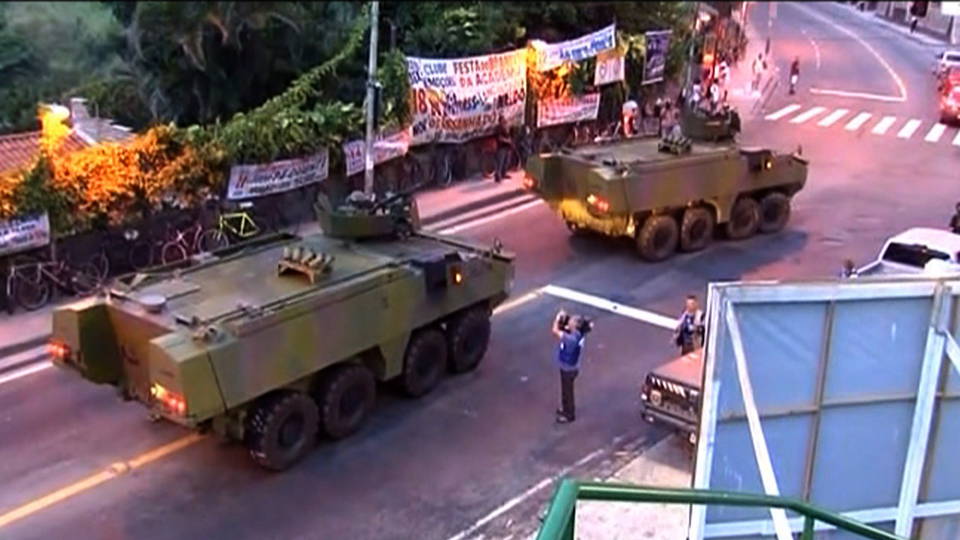
Amnesty International says police in Brazil have killed at least 11 people this month in Rio de Janeiro, where the Olympic Games are set to begin in less than 100 days. Amnesty says the majority of the victims are young black men from the city’s poorer neighborhoods, known as favelas. In 2015, 307 people were killed by police in Rio—which accounted for one in every five homicides.
Atlantic City on Verge of Default, Possible State Takeover
Atlantic City is likely to default on a $1.8 million bond payment due Sunday, making it the first New Jersey city to go into default since the Great Depression. New Jersey Governor Chris Christie has proposed taking over the city’s operations, a move which would give the state power to sell off city assets and break union contracts. Atlantic City Mayor Don Guardian has pushed back against the state plan, calling it a "fascist dictatorship."
Verizon Workers' Strike Continues into Second Week
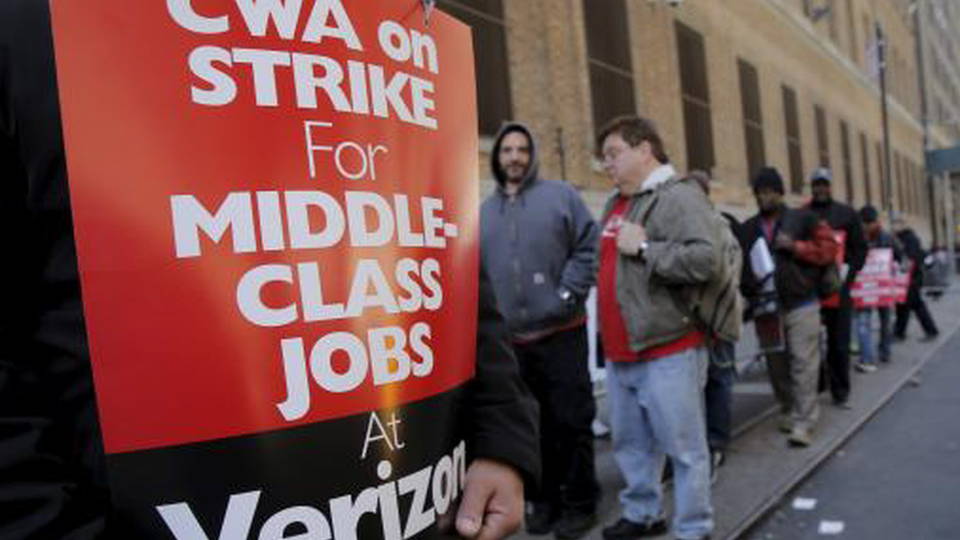
The Verizon workers’ strike has entered its second week, with tens of thousands of workers on strike up and down the East Coast. It’s one of the biggest U.S. strikes in years. Verizon has sought to cut pensions and ease the outsourcing of work. At a picket line in Brooklyn on Wednesday, Al Pemberton, chief steward of Communication Workers of America Local 1109, spoke out.
Al Pemberton: "My name is Al Pemberton, and I’m a field technician out of Verizon Wireline. We’re fighting for middle-class jobs. Most of us are going to be retiring in a few years, but we want to make sure that the communities that we serve have good middle-class jobs to pass on to the young people coming up. And we think that that should be a positive thing for the community and for the government as a whole, because you’ve got good-paying jobs, you pay taxes, and then most services can be rendered to the community through that process."
Sandra Bland's Mother to Congressional Caucus: "Wake Up"
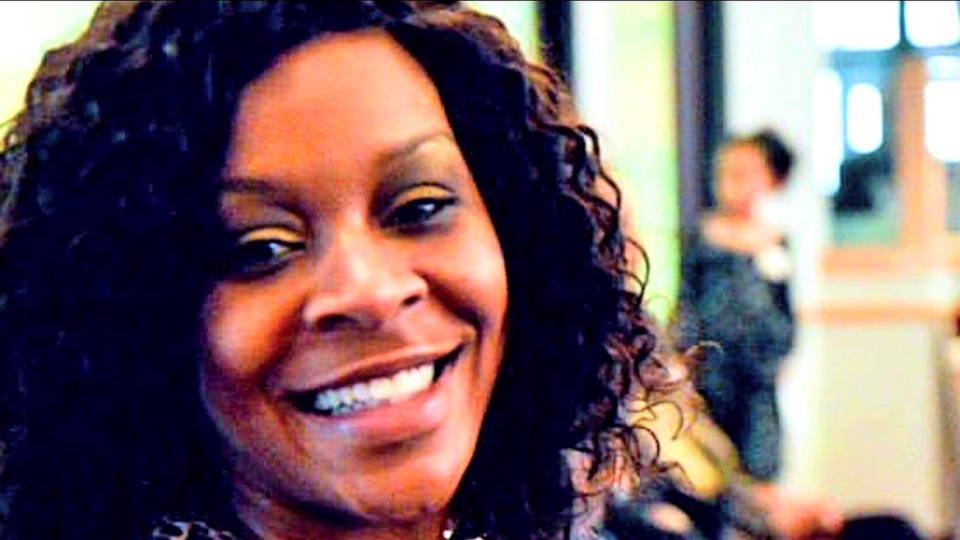
In Washington, D.C., Geneva Reed-Veal, the mother of Sandra Bland, spoke at the newly formed Congressional Caucus on Black Women and Girls’ first symposium about the death of her daughter, who was found hanged in a Texas jail cell in July 2015, three days after she was arrested over an alleged traffic violation. Reed-Veal maintains her daughter did not commit suicide. During her testimony at the Library of Congress Thursday, she highlighted the high number of women who die in U.S. jails.
Geneva Reed-Veal: "Show of hands: Can anybody in the room tell me the other six women who died in jail July 2015 along with Sandra Bland? That is a problem. You all are among the walking dead. And I am so glad that I have come out from among you."
Yale Refuses to Rename Dorm Named After Pro-Slavery Advocate
And Yale University has announced it will not rename the residential dorm Calhoun College, named after former Vice President John C. Calhoun, one of the most prominent pro-slavery figures in history. This comes despite a recent wave of student protests demanding the name be changed. Yale said it will name one of the two new residential dorms after African-American alumnus and legal scholar Anna Pauline Murray. It will be the first time a Yale dorm bears the name of either an African American or a woman.
Donate today:
Follow:

4/29 Fresno, CA
4/30 San Mateo, CA
4/30 Grass Valley, CA
5/1 Houston, TX
5/1 New Orleans, LA
5/2 Sarasota, FL
5/3 Atlanta, GA
5/4 Spokane, WA
5/5 Olympia, WA
5/6 Seattle, WA
5/7 Mount Vernon, WA
5/8 Eugene, OR
5/8 Portland, OR
more
NEW BOOK

Amy Goodman on AJ+: How the Media Ruins Elections
WORK WITH DN!

Amid Media Megamergers, A Mosaic of Community Media Thrives
207 West 25th Street, 11th Floor
New York, New York 10001, United States
---------------------
---------------------






No comments:
Post a Comment